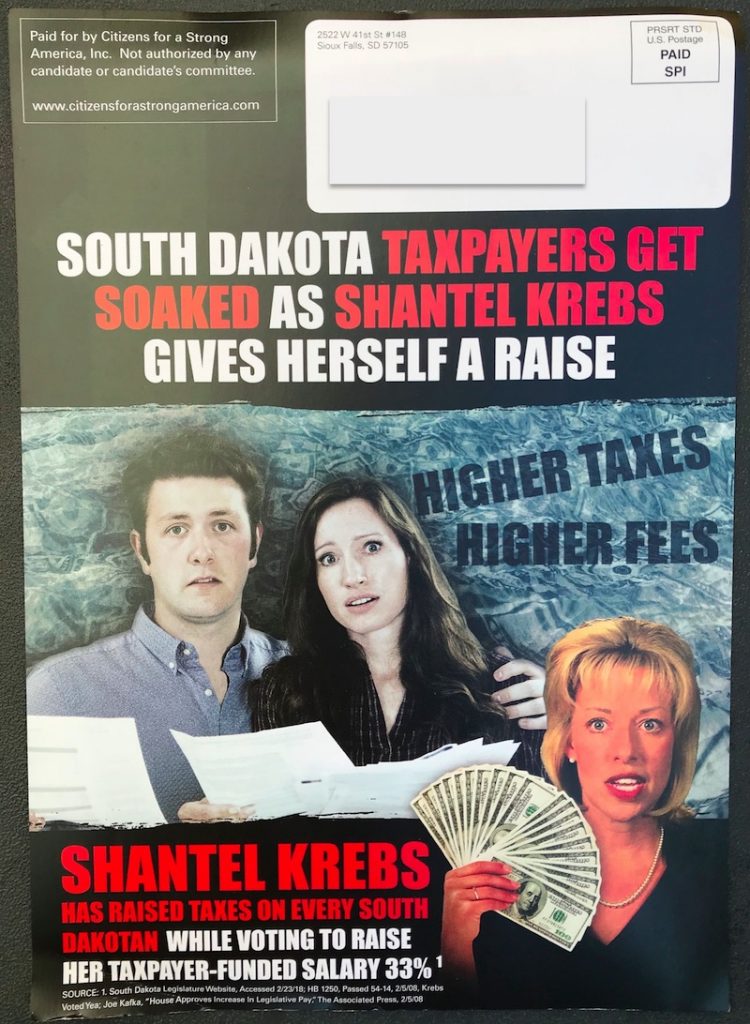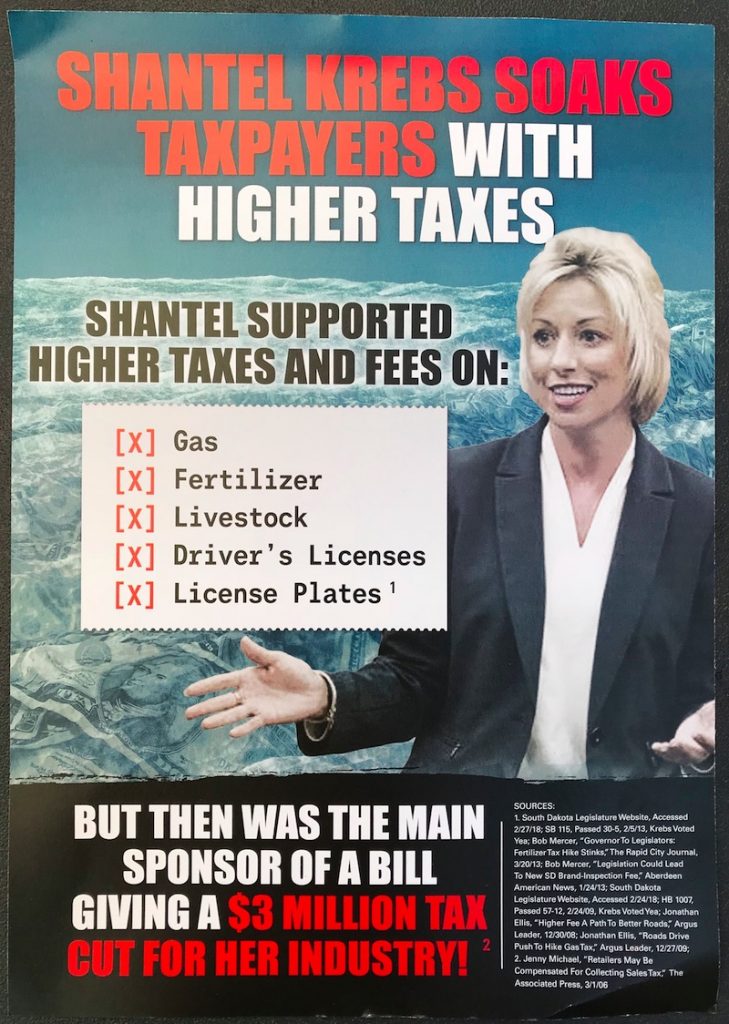Citizens for a Strong America continues to work harder than necessary to paint Shantel Krebs as a a self-serving big-government tax-grabber. A friend in Brookings has received a second giant postcard from the North Carolina-addressed PAC calling out the Republican U.S. House candidate for voting for a variety of tax increases:


This card repeats exactly the votes and sources cited in the card I spotlighted and source-checked last week. Does it make sense to send a second card to the same addresses simply repeating the same charges made in an earlier card? What’s more effective: reinforcing a strong attack message, or offering a new line of attack to spread the debate and to win over people not persuaded by the first line?
While mostly repetitive, this card makes a couple of positive changes from the original. CfSA amends the attack line on the address side from “Shantel Krebs repeatedly raised taxes on others while raising her own taxpayer-funded salary,” to “Shantel Krebs has raised taxes on every South Dakotan while voting to raise her taxpayer-funded salary 33%.” The new wording on that latter phrase is more accurate: as I noted last week, Krebs voted for 2008 HB 1250 to raise legislator pay from $6,000 to $8,000 a year, but that measure did not pass. She did not raise her pay, but she did vote to raise her pay.
I also like the design of this card better. The hapless folks in the background show an arrogant legislator putting herself before the people. The cash in Krebs’s hand is a strong visual. Plus, the fonts are stronger and more consistent, and the colors catch the eye better than those in the previous card.
As a reader pointed out this morning, my initial contention that these cards are coming from a Koch-y PAC pushing hard-right conservatism was wrong. Citizens for a Strong America shares a name with a Tea Party-esque Wisconsin group but not a hard-right agenda. Seth Tupper explains that this Citizens for a Strong America super PAC fits more with mainstream-y Dusty Johnsonism than with the more extreme Trumpiness Krebs has embraced in this campaign:
Postcards critical of U.S. House candidate Shantel Krebs that were delivered recently to the mailboxes of South Dakota Republicans can be traced to a nonprofit in Washington, D.C., that has mobilized wealthy donors to help centrist candidates and oppose political extremism.
The nonprofit is No Labels. It has connections to several political action committees, including Citizens for a Strong America Inc., which sent the anti-Krebs postcards. Collectively, the PACs have raised about $9 million since last March, mainly from a few dozen wealthy contributors, including recognizable names such as Jerry Reinsdorf, who owns the Chicago White Sox, and Bud Selig, the former commissioner of Major League Baseball [Seth Tupper, “Super PAC Attack on Krebs Has Ties to ‘No Labels’ Movement,” Rapid City Journal, updated 2018.05.29].
Tupper’s explanation of this No Labels campaign makes sense in light of Dusty Johnson’s embrace of the tax-vote attack on Krebs. Johnson and No Labels can’t really use that line to say Johnson is a better candidate, since the tax increases in question passed on the support of moderate Republican legislators over the objection of the conservative wingnuts in Pierre. Had Dusty been a legislator, he probably would have voted for those same moderate tax increases. Heck, while Johnson was chief of staff to Governor Dennis Daugaard, the governor sent advisors to present and lobby for the 2013 brand board fee increase that’s on this card.
So check out the judo: the tax votes in question aren’t rabid big-government liberalism. They are the sort of practical problem-solving that CfSA/No Labels is trying to promote over Tea Party extremism. But CfSA/No Labels is mailing these cards to hard-right-leaning South Dakota Republican primary voters, not to make them like Johnson more but to make them like Krebs less. These cards seek to depress Krebs voters and make them either stay home or drift over to the feckless Neal Tapio.
Tupper points us to this March 25, 2018, article from The Hill that says No Labels is helping protecting moderates from “flamethrowers” in the primaries but staying out of the general election:
A Democratic wave in November could bring down a number of Republican members of the Problem Solvers Caucus. But No Labels doesn’t plan to get involved in general elections, believing that focusing on primary fights will help the group avoid angering either party.
“The goal is not to oppose the parties, the goal is not to be hostile to Democrats or Republicans,” Clancy said.
“The goal is to ensure that in every race around the country where there’s a fight between someone who is eminently consensus-oriented and has a record of working collaboratively to actually achieve things, and someone who is running on a policy of obstruction, that we promote the former and try to defeat the latter” [Ben Kasimir, “Bipartisan ‘No Labels’ Aims to Protect Moderates in Primary Fights,” The Hill, 2018.03.25].
Intervening in primaries but not the general is interesting positioning, especially in South Dakota. If Johnson wins the GOP primary (and the only poll worth looking at so far says that’s very likely, pegging Johnson at 41%, Krebs at 23%, and Tapio at 13%), he’ll face Democrat Tim Bjorkman, who has his Sanders streaks but is campaigning like a moderate Herseth Blue Dog who wants to avoid party labels. In that match-up, Johnson could very well reverse conventional thinking: after distinguishing himself from Krebs and Tapio as the sensible non-radical, he might have to distinguish himself from Bjorkman by sending stronger conservative signals to keep his GOP base motivated.
So that is No Labels. I seem to remember hearing about them several years ago, maybe even 2008. I’m not sure, but i think I saw Sam Waterston on a late night talk show promoting this group with a goal of reducing partisanship. I can’t say for certain. Hmmm.